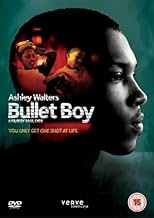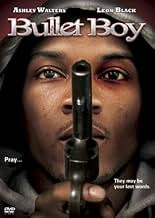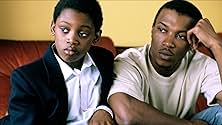CALIFICACIÓN DE IMDb
6.5/10
2.9 k
TU CALIFICACIÓN
Agrega una trama en tu idiomaTwo troubled, street-smart boys, Ricky and Curtis, who struggle to navigate a volatile neighborhood. They face challenges in friendships, family and loyalty, as guns become a reality and boy... Leer todoTwo troubled, street-smart boys, Ricky and Curtis, who struggle to navigate a volatile neighborhood. They face challenges in friendships, family and loyalty, as guns become a reality and boys try to be men before they're teenagers.Two troubled, street-smart boys, Ricky and Curtis, who struggle to navigate a volatile neighborhood. They face challenges in friendships, family and loyalty, as guns become a reality and boys try to be men before they're teenagers.
- Dirección
- Guionistas
- Elenco
- Premios
- 3 premios ganados y 3 nominaciones en total
Clare Perkins
- Beverley
- (as Claire Perkins)
Sharea Samuels
- Shea
- (as Sharea-mounira Samuels)
Jaime Winstone
- Natalie
- (as Jamie Winstone)
- Dirección
- Guionistas
- Todo el elenco y el equipo
- Producción, taquilla y más en IMDbPro
Opiniones destacadas
Bullet Boy is the sort of film that deserves to be seen by far more people than are, unfortunately, ever likely to see it. It's utterly gripping the whole way through - almost every scene is filled an unbearably tense air of looming tragedy, as events spiral out of control. The cast (a mixture of professionals and non-actors) all give superb, deeply honest performances, most notably Ashley Walters and Claire Perkins.
Where most British films that strive for an air of realism fail by simply trying too hard, laying on the "grittiness" far too thick, Bullet Boy always seems completely natural, unforced and unfailingly true-to-life. While it's undeniably a fairly bleak and upsetting tale, the film is never boring, never depressing, never anything less than wholly involving. Crafting something genuinely special with a very limited budget, this is a great feature debut from documentary maker Dibb. You shouldn't see Bullet Boy because it's an "issue" film (although the issue it addresses is extremely important); you should see it because it's a brilliant film.
Where most British films that strive for an air of realism fail by simply trying too hard, laying on the "grittiness" far too thick, Bullet Boy always seems completely natural, unforced and unfailingly true-to-life. While it's undeniably a fairly bleak and upsetting tale, the film is never boring, never depressing, never anything less than wholly involving. Crafting something genuinely special with a very limited budget, this is a great feature debut from documentary maker Dibb. You shouldn't see Bullet Boy because it's an "issue" film (although the issue it addresses is extremely important); you should see it because it's a brilliant film.
'Bullet Boy' is an understated drama about an ex-convict trying to go straight in London's black community. The piece is nicely assembled and acted, and makes good visual use of its Hackney setting, but there's nothing in the story which is ultimately surprising. I also have one quibble: the film features a fair amount of gun usage, but we don't see any underlying criminal activity, which is (I think) usually the root cause of shootings. On the other hand, one strength is that the world of the characters is not depicted as a squalid ghetto, but rather as a place in which one can imagine real people living in. Overall, this is not a bad film; but it is a little bland.
This film was painful to sit through. Went to the screening at the London film festival and couldn't believe the stereo typical representations with dialogue so bad (it made me cringe) I couldn't understand how the film council can spend tax payers money on something so pointless.
I went with two black friends of mine to see the film. For a film that's supposed to be of serious nature they laughed all the way through it as if it was a comedy. I assumed I wasn't getting the jokes but later found out they were laughing at it rather than with it.
It was obvious that the executives at film council have none or very little knowledge about the black community in London. I've worked with many black children/ youth and I couldn't recognise many of the characters that appeared on the film.
I wasn't surprised to find out that the producers of this very awful film are actually executives at the film council. NO WONDER. This isn't a film I recommend even when it's on TV.
I went with two black friends of mine to see the film. For a film that's supposed to be of serious nature they laughed all the way through it as if it was a comedy. I assumed I wasn't getting the jokes but later found out they were laughing at it rather than with it.
It was obvious that the executives at film council have none or very little knowledge about the black community in London. I've worked with many black children/ youth and I couldn't recognise many of the characters that appeared on the film.
I wasn't surprised to find out that the producers of this very awful film are actually executives at the film council. NO WONDER. This isn't a film I recommend even when it's on TV.
I would like to start off saying that I appreciated the movie for dealing with the black community in London. No rude cockney gangsters, catchy crime scams or laughably stupid dope dealers. The family this movie deals with is a single mum home with two sons, one just out of prison, the other still too young to be involved in anything hazardous, but looking up at his brother and already copying some of his ways.
I enjoyed the language and the characters who were all convincing and complex enough but, how carefully put down they were, the more obvious and stereotypical were the things happening to them. Everything going from bad to worse, who plays with fire is gonna get burnt. And then the ultimate contrast of either sinking into crime and sin (devil), or choosing the righteous path and go to church every Sunday (god).
This easy moralism hurt the rest of the film. It made things predictable. It was like a newspaper article collage, one shock after the other. It took away much of the complexity that I found in the characters themselves. It really is a shame because the development of the characters could have been much more subtle and would have fit in better with the style of the movie that deals with a gritty context matter but managed to use a soft and sometimes almost dreamy camera and score, not unlike other recent British films, such a 'Morvern Callar' and '16 Years of alcohol'.
I enjoyed the language and the characters who were all convincing and complex enough but, how carefully put down they were, the more obvious and stereotypical were the things happening to them. Everything going from bad to worse, who plays with fire is gonna get burnt. And then the ultimate contrast of either sinking into crime and sin (devil), or choosing the righteous path and go to church every Sunday (god).
This easy moralism hurt the rest of the film. It made things predictable. It was like a newspaper article collage, one shock after the other. It took away much of the complexity that I found in the characters themselves. It really is a shame because the development of the characters could have been much more subtle and would have fit in better with the style of the movie that deals with a gritty context matter but managed to use a soft and sometimes almost dreamy camera and score, not unlike other recent British films, such a 'Morvern Callar' and '16 Years of alcohol'.
Back in 1980, Franco Rosso's Babylon, starring Aswad's Brinsley Forde, told the story of young black Britain under siege. Filmed around Deptford, Lewisham and Brixton in south London and financed by the National Film Council, it drew a fundamentally honest, unsentimental portrait, employing a rich, unsubtitled patois. Understandably, much of the film also dealt with racism - white on black - and its tragic repercussions.
Twenty-five years on, the most significant (and depressing) thing about Saul Dibb's study of black Londoners is its frank recognition that the hate and violence has since turned inward - manifested in gun crime.
In Bullet Boy, 20-year-old Ricky (Walters, aka So Solid Crew's Asher D) is paroled from youth custody and attempts to rekindle a relationship with his girlfriend Shea (Samuels). Hooking up with his hot-headed friend - the ironically named Wisdom (Black) - he almost immediately runs into trouble with rival Godfrey (Lawson) in a road rage incident. As the tit-for-tat feud escalates, Ricky's impressionable 12-year-old brother Curtis (Fraser) discovers a gun which Wisdom has given Ricky for his protection - and the murderous cycle of violence continues.
This is a film of firsts. Arriving some 15 years after a brace of similarly-themed American films, such as John Singleton's Boyz N The Hood, this is the first film to spotlight gun violence in Britain's black community, and makes an interesting comparison. It's documentary maker Dibb's first feature too, having previously made 'Electric Avenue' and 'The Tottenham Ayatollah' for Channel 4 television. And it's Asher's (okay, Walters') movie debut.
It's a cute - and astute - stroke of casting: he'd read the script while in prison for gun possession. And the cast is one of the things Bullet Boy has got right, featuring gutsy and unsentimental performances, particularly from the all too convincing lead, but also from stand-up comedian Curtis Walker as a former bad-boy-turned-pastor and Perkins as a pragmatic matriarch.
The use of non-professional actors also imbues proceedings with documentary-style naturalism, matched by the film's east London locations, photographed by Marcel Zyskind in pitiless natural light, and employed very effectively during a recurring motif of a dead dog floating on a river like the ghost at the feast.
Though Dibb cannot hope to encompass the whole subject matter in a 90-minute film, his focus on how gun culture affects the entire family unit is an intelligent approach, making the wider issue accessible - and subsequently harder hitting.
If certain sequences appear heavy-handed - 12-year-old Curtis playing shoot-em-up videogames as a prescient prelude to tragedy; the Godfather-style juxtaposition between a church sermon and a murder - well, perhaps that's the way it ought to be.
Twenty-five years on, the most significant (and depressing) thing about Saul Dibb's study of black Londoners is its frank recognition that the hate and violence has since turned inward - manifested in gun crime.
In Bullet Boy, 20-year-old Ricky (Walters, aka So Solid Crew's Asher D) is paroled from youth custody and attempts to rekindle a relationship with his girlfriend Shea (Samuels). Hooking up with his hot-headed friend - the ironically named Wisdom (Black) - he almost immediately runs into trouble with rival Godfrey (Lawson) in a road rage incident. As the tit-for-tat feud escalates, Ricky's impressionable 12-year-old brother Curtis (Fraser) discovers a gun which Wisdom has given Ricky for his protection - and the murderous cycle of violence continues.
This is a film of firsts. Arriving some 15 years after a brace of similarly-themed American films, such as John Singleton's Boyz N The Hood, this is the first film to spotlight gun violence in Britain's black community, and makes an interesting comparison. It's documentary maker Dibb's first feature too, having previously made 'Electric Avenue' and 'The Tottenham Ayatollah' for Channel 4 television. And it's Asher's (okay, Walters') movie debut.
It's a cute - and astute - stroke of casting: he'd read the script while in prison for gun possession. And the cast is one of the things Bullet Boy has got right, featuring gutsy and unsentimental performances, particularly from the all too convincing lead, but also from stand-up comedian Curtis Walker as a former bad-boy-turned-pastor and Perkins as a pragmatic matriarch.
The use of non-professional actors also imbues proceedings with documentary-style naturalism, matched by the film's east London locations, photographed by Marcel Zyskind in pitiless natural light, and employed very effectively during a recurring motif of a dead dog floating on a river like the ghost at the feast.
Though Dibb cannot hope to encompass the whole subject matter in a 90-minute film, his focus on how gun culture affects the entire family unit is an intelligent approach, making the wider issue accessible - and subsequently harder hitting.
If certain sequences appear heavy-handed - 12-year-old Curtis playing shoot-em-up videogames as a prescient prelude to tragedy; the Godfather-style juxtaposition between a church sermon and a murder - well, perhaps that's the way it ought to be.
¿Sabías que…?
- TriviaShot largely within one square mile on the edge of Hackney.
- ErroresWhen Rio and Leon are playing hide and seek, the boom microphone is visible in the lower left corner screen for a second.
- ConexionesFeatured in Louis Theroux Interviews...: Ashley Walters (2023)
Selecciones populares
Inicia sesión para calificar y agrega a la lista de videos para obtener recomendaciones personalizadas
- How long is Bullet Boy?Con tecnología de Alexa
Detalles
- Fecha de lanzamiento
- País de origen
- Sitio oficial
- Idioma
- También se conoce como
- The Boys
- Locaciones de filmación
- Productoras
- Ver más créditos de la compañía en IMDbPro
Taquilla
- Presupuesto
- GBP 1,000,000 (estimado)
- Total a nivel mundial
- USD 572,990
- Tiempo de ejecución1 hora 29 minutos
- Color
- Mezcla de sonido
- Relación de aspecto
- 2.35 : 1
Contribuir a esta página
Sugiere una edición o agrega el contenido que falta

Principales brechas de datos
By what name was Bullet Boy (2004) officially released in India in English?
Responda
























